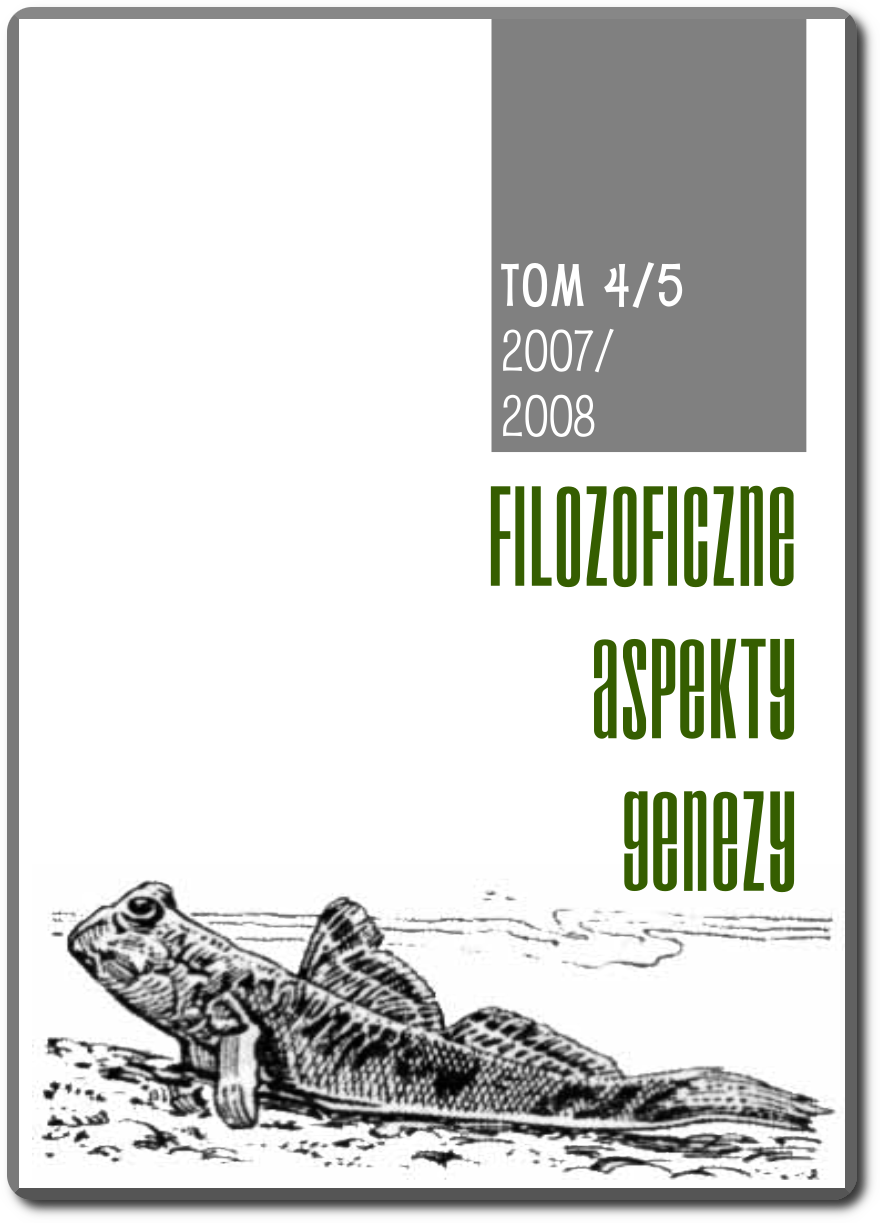Polemiki
Czy teoria inteligentnego projektu posiada konsekwencje, dotyczące istnienia nadnaturalnego projektanta? Polemika z Elliottem Soberem
Opublikowane 21.05.2021
Słowa kluczowe
- nadnaturalny projektant,
- nadnaturalizm,
- inteligentny projekt,
- kreacjonizm,
- darwinizm
- religijna neutralność ...More

Utwór dostępny jest na licencji Creative Commons Uznanie autorstwa 4.0 Międzynarodowe.
Jak cytować
Jodkowski Kazimierz, Czy teoria inteligentnego projektu posiada konsekwencje, dotyczące istnienia nadnaturalnego projektanta? Polemika z Elliottem Soberem, Filozoficzne Aspekty Genezy 2021, pp. 41-49, https://doi.org/10.53763/fag...33
Abstrakt
Jest to polemika z artykułem Elliotta Sobera, Teoria inteligentnego projektu a nadnaturalizm.
Downloads
Download data is not yet available.
Bibliografia
- Krauthammer Charles, „Let’s Have No More Monkey Trials. To teach faith as science is to undermine both”, Time Aug. 01, 2005, http://tiny.pl/b9xt.
- Coyne Jerry, „The Case Against Intelligent Design. The Faith That Dare Not Speak Its Name”, The New Republic 22 August, 2005, http://tiny.pl/b9x7.
- Dawkins Richard, „Creationism: God’s Gift to the ignorant”, The Times May 21, 2005; http://tiny.pl/b9x9.
- The Elie Wiesel Foundation For Humanity. Nobel Laureates Initiative, September 9, 2005, To: Kansas State Board of Education, http://media.ljworld.com/pdf/2005/09/15/nobel_letter.pdf.
- Berman Marshall, „Intelligent Design: The New Creationism Threatens All of Science and Society”, APS News October 2005, vol. 14, no. 9; http://tiny.pl/b9xc.
- Berman Marshall, „Intelligent Design Creationism: A Threat to Society – Not Just Biology”, The American Biology Teacher November/December 2003, vol. 65, no. 9, s. 646-648, http://tiny.pl/b9xf.
- Crease Robert P., „Critical Point: Intelligent Design”, Physics World, October 2005, vol. 18, no. 10, s. 19.
- Pennock Robert T., Tower of Babel. The Evidence against the New Creationism, A Bradford Book, The MIT Press, Cambridge, Massachusetts – London, England 1999.
- Pennock Robert T. (ed.), Intelligent Design Creationism and Its Critics. Philosophical, Theological and Scientific Perspectives, A Bradford Book, The MIT Press, Cambridge, Massachusetts – London, England 2001.
- Forrest Barbara C. and Gross Paul R., Evolution and the Wedge of Intelligent Design: The Trojan Horse Strategy, Oxford University Press, Oxford 2003.
- Scott Eugenie C., „The Creation/Evolution Continuum”, NCSE Reports 1999, vol. 19, no. 4.
- Scott Eugenie C., Evolution vs. Creationism. An Introduction, Greenwood Press, Westport, Connecticut – London 2004.
- Życiński Józef, Bóg i ewolucja. Podstawowe pytania ewolucjonizmu chrześcijańskiego, Prace Wydziału Filozoficznego 89, Towarzystwo Naukowe Katolickiego Uniwersytetu Lubelskiego, Lublin 2002.
- Behe Michael J., „Współczesna hipoteza inteligentnego projektu. Łamanie reguł”, przeł. Dariusz Sagan, Na Początku… 2004, Rok 12, Nr 7-8 (183-184), s. 244-266, http://tiny.pl/b9mh.
- Behe Michael J., Czarna skrzynka Darwina. Biochemiczne wyzwanie dla ewolucjonizmu, przeł. Dariusz Sagan, Biblioteka Filozoficznych Aspektów Genezy t. 4, Wydawnictwo MEGAS, Warszawa 2008.
- Behe Michael J., „Filozoficzne zarzuty stawiane hipotezie inteligentnego projektu: odpowiedź na krytykę”, przeł. Dariusz Sagan, Filozoficzne Aspekty Genezy 2004, t. 1, s. 115-139, http://tiny.pl/b9mq.
- Behe Michael J., „Faith and the Structure of Life” (oprac. z: Michael J. BEHE, „Faith and the Structure of Life”, w: Gerard V., Bradley and Don Demarco (eds.), Science and Faith, St. Augustine’s Press, South Bend, Indiana, rozdział 2), http://tiny.pl/b9mt.
- Ostling Richard N., „«Intelligent design» gains attention in Ohio debate”, News – Star Shawnee, Oklahoma, Saturday, March 16, 2002, http://tiny.pl/b9m7.
- Scott Eugenie C. and Branch Glenn, „Evolution: Just teach it”, USA Today 8/14/2005, http://tiny.pl/b9m9.
- Jodkowski Kazimierz, Wspólnoty uczonych, paradygmaty i rewolucje naukowe, Realizm. Racjonalność. Relatywizm t. 22, Wyd. UMCS, Lublin 1990, http://tiny.pl/v3d5.
- Jodkowski Kazimierz, Metodologiczne aspekty kontrowersji ewolucjonizm-kreacjonizm, Realizm. Racjonalność. Relatywizm t. 35, Wyd. UMCS, Lublin 1998, http://tiny.pl/b9m2.
- Jodkowski Kazimierz, „Antynaturalizm teorii inteligentnego projektu”, Roczniki Filozoficzne 2006, t. 54, nr 2, s. 63-76, http://tiny.pl/b9mb.
- Dembski William A., „Introduction: Mere Creation”, w: William A. Dembski (ed.), Mere Creation. Science, Faith & Intelligent Design, InterVarsity Press, Downers Grove, Illinois 1998, s. 13-30.
- Woodward Thomas, Darwin Strikes Back. Defending the Science of Intelligent Design, Baker Books, Grand Rapids, Michigan 2006.
- Dembski William A., McDowell Sean, Understanding Intelligent Design. Everything You Need to Know in Plain Language, Harvest House Publishers, Eugene, Oregon 2008.
- Jones John E. III, „Kitzmiller v. Dover Area School District”, http://tiny.pl/b9mz.
- Bergman Jerry, The Criterion: Religious Discrimination in America, Onesimus, Richfield, Minnesota 1984.
- Bergman Jerry, Slaughter of the Dissidents: The Shocking Truth about Killing the Careers of Darwin Doubters, Leafcutter Press 2008.



